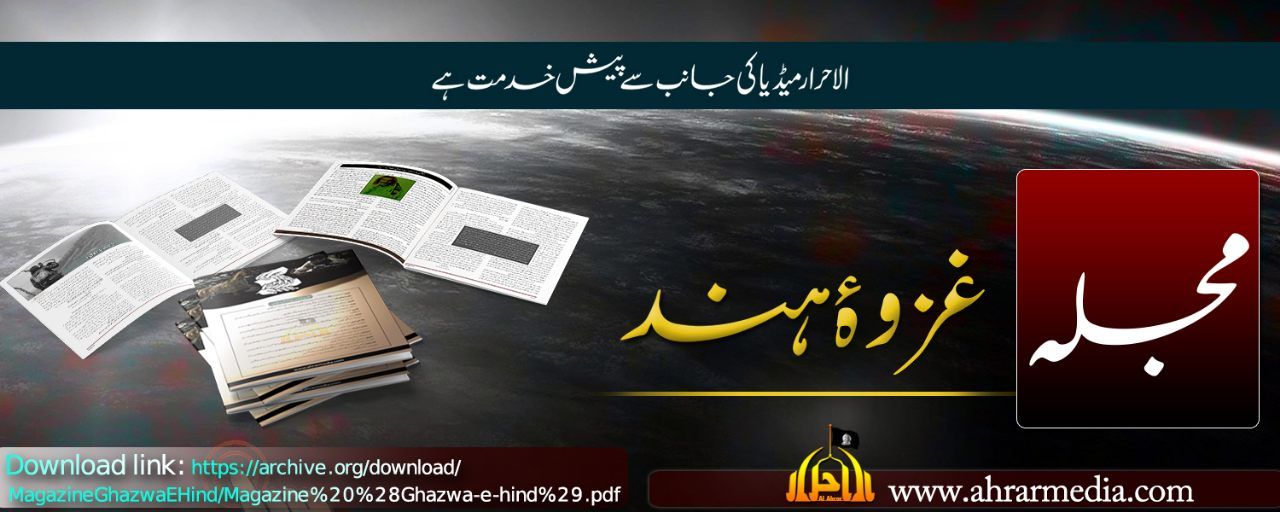
________________
To inquire about a translation for this video message for a fee email: [email protected]

________________
To inquire about a translation for this video message for a fee email: [email protected]
These people did not have a history of positive feelings towards the Islamic Emirate. They considered IEA to be a regional organization or movement limited to Afghanistan. The question arose, why hadn’t they declared the ideology of global jihad instead of concentrating on a national focus? They also expressed these feelings in private but their small numbers and the respect of other groups for the Islamic Emirate forced them to remain silent.
After the establishment of ISIS’s Khorasan branch, a media campaign was launched for them to attract other fighters. This campaign was effective and many people moved from Tehreek-e-Taliban Pakistan, Jamaat-ul-Ahrar and Lashkar-e-Jhangvi to ISIS Khorasan. I remember that Jamaat-ul-Ahrar (a break- away group from TTP) was also made an offer by ISIS to become a part of ISIS Khorasan. This was also discussed within the organization (Jamaat ul Ahrar). The head of the Jamaat ul Ahrar, Omar Khalid Khorasani wanted to join ISIS but three or four other people, including myself, opposed it. However despite this, we were ordered to start supporting ISIS in the media unannounced or at least not to oppose the group. In addition, ISIS contacted TTP and tried to use persuasive tactics but these approaches were strongly rejected. Some commanders went individually in support of ISIS but after a while they too became remorseful and joined TTP again.
As the debate over joining ISIS within the Jamaat-ul-Ahrar escalated, we decided in consultation that instead of joining the Khurasan branch of ISIS, we should be made head of ISIS’s “Wilayah Hind” which includes Pakistan, India and Bangladesh. ISIS main focus was however Afghanistan and they refused to accept the demand of Jamaat-ul-Ahrar. To achieve this goal, Jamaat-ul-Ahrar sent a delegation, one was also sent to ISIS Central Command in Iraq and Syria, which I will describe in detail on another occasion.
=&0=&
After announcing the existence of ISIS in Khorasan, ISIS then declared the caliphate in the region, but they were not prepared for it at all.
ISIS fighters have mostly occupied Pashtun areas of Afghanistan bordering Pakistan where there is a tradition and culture that the residents are not willing to give up, especially if someone tries to force them. ISIS did not respect or realize this and they wanted to impose a self-styled caliphate on its residents and impose its own ideology. As a result, people became fierce opponents of the group and even took up arms and started forming anti-ISIS lashkars. ISIS responded by carrying out extremely inhumane acts against the common people which proved to be the starting point of their downfall. In addition, ISIS did not take any precaution in its operations against government targets in Afghanistan, targeting mostly civilians who, according to its ideology, had the right to be expelled from Islam and killed.
In view of this practice, Sheikh Abdul Rahim Muslim Dost, who introduced ISIS in the region not only quit the group but also declared their actions un-Islamic and inhumane which was a great shock to ISIS. Later on the Tehreek-e-Taliban also issued a fatwa against ISIS. These announcements and fatwas naturally raised suspicions among the militants about ISIS. One of the main reasons for the militant keeping a distance from ISIS was that they forced those who joined the organization to follow a particular school of thought because they considered other people as heretics and misguided. It is a very difficult decision for any religious person to leave his school of thought, this process kept the militants away from ISIS. Public opinion also formed very quickly against ISIS and none accepted the group wholeheartedly. That is why the people or other groups who were thinking of moving towards them, in reality moved away.
=&1=&=&2=&
Claims of operations by the Afghan government and NATO forces against ISIS continue to surface however the Islamic Emirate of Afghanistan challenged the group soon after it formed and IEA continue to have a key role to play in kicking ISIS out of the region. The government operations against ISIS were limited in impact because the government did not exist in areas where ISIS had strongholds. Therefore, as soon as the operations started, ISIS would move to other nearby areas after a slight resistance and re-settle when the operation ended. In addition, information on the relations of ISIS with various states and their sponsorship began to surface through a series of rumours. I will analyse these during later sessions with some undeniable facts highlighting how state operations against ISIS were largely ineffective.
In contrast, when the Islamic Emirate launched operations against ISIS, this proved disastrous for them. These operations were more effective because the Islamic Emirate was not only present at the local level but also most importantly had the support of the people of Nangarhar behind them. After operations against ISIS in different parts of the country, ISIS fled to Kunar, another province of Afghanistan, where they already had hideouts. A determined Islamic Emirate pursued them here as well and as soon as winter was over they launched operations against ISIS dispersing their fighters and making it difficult for them to live in the mountains.
=&3=&
The Islamic Emirate’s successive operations against ISIS have killed most of its remaining fighters who survived earlier operations. It became increasingly difficult for ISIS to survive in the mountainous areas of Kunar and Nangarhar in Afghanistan. This was due to the disconnect of ISIS Khorasan from ISIS Central Command in Iraq and Syria that had previously sent delegations to each other and the constant war situation, they also fell victim to a severe financial crisis which led to a state of chaos within the organization.
In this difficult situation, ISIS Khurasan fighters had two options, either to be killed or to surrender to the Afghan government. ISIS fighters began surrendering in the hope that they would be released after being held in a rehabilitation centre for some time because there were already known examples where the Afghan government released those who had given themselves up.
Following operations by the Islamic Emirate, the surviving leadership of ISIS turned to the cities of Afghanistan from where the news of fellow fighters being arrested was emerging. The names of Aslam Farooqi and Abu Omar Al-Khurasani are noteworthy. After contacting some former friends inside ISIS, Abu Talha Khurasani claimed that his arrested leadership had surrendered to the Afghan government which had declared his arrest but their claims are difficult to substantiate.
In light of all this, I can say with certainty that it is now impossible for ISIS to maintain its presence in this region (Khorasan). The implementation of the peace agreement between the United States and the Taliban in Afghanistan will make their problems worse and it will be impossible for ISIS to stay there. The only way for ISIS to survive is for an agency or the state to sponsor the group and breathe new life into it. In the past, states and agencies have taken such a course for their own interests.
_________________

___________
To inquire about a translation for this video message for a fee email: [email protected]
—

Click the following link for a safe PDF copy: Ghazwa-e-Hind Magazine #2
___________
To inquire about a translation for this magazine issue for a fee email: [email protected]

To inquire about a translation for this magazine issue for a fee email: [email protected]


To inquire about a translation for this statement for a fee email: [email protected]